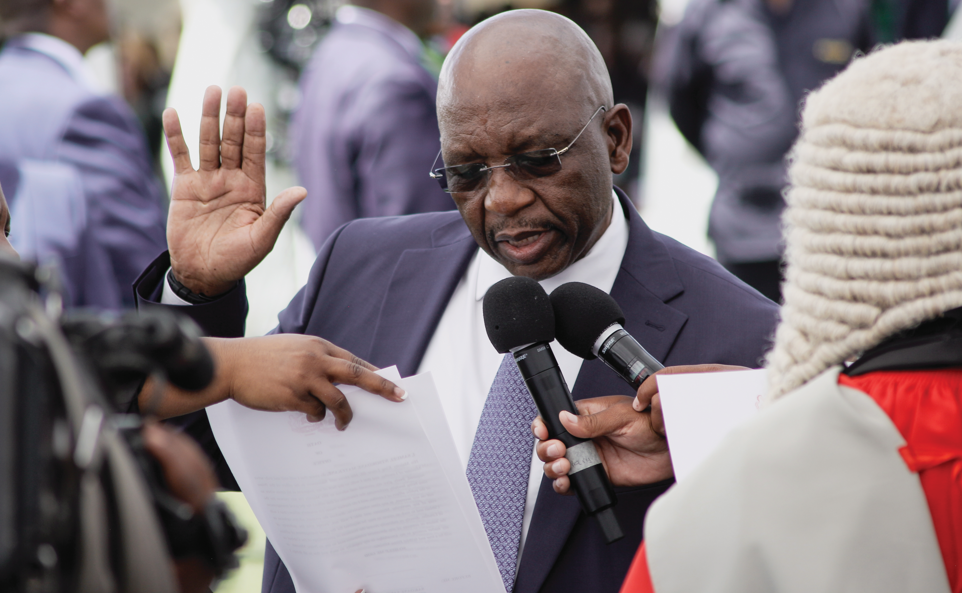Prime Minister Ntsokoane Samuel Matekane has become Lesotho’s longest-serving consecutive Prime Minister since the 2012 general election, surpassing the turbulent tenures of Pakalitha Mosisili and Thomas Thabane.
As of today, October 3, 2025, Matekane has served 1,072 days in office as prime minister. This calculation includes his inauguration on October 28, 2022, up to and including October 3, 2025, and accounting for the leap day in 2024.
This places him ahead of Thabane’s first term of 1,013 days (2012–2015), Mosisili’s 823 days (2015–2017), Thabane’s second term of 1,069 days (2017–2020), and Moeketsi Majoro’s 892 days (2020–2022).
It is the first time since 2012 that a prime minister has managed to stay in power for this long.
This milestone underscores Matekane’s rare stability in office compared to his predecessors. Since the return to democracy in 1993, Lesotho’s leaders have been repeatedly rattled by coups, riots, and early exits. Ntsu Mokhehle was toppled by soldiers in 1994 before being reinstated.
Mosisili, who succeeded Mokhehle in 1998, faced riots within six months, prompting a plea for military intervention from South Africa and Botswana. Despite foreign troops’ presence, widespread arson and looting destroyed Maseru’s CBD and several towns, leaving scars that took years to rebuild.
Thabane, who followed Mosisili, less than two and a half years before fleeing to South Africa in 2014, claiming an attempted coup.
But stability alone will not guarantee Matekane’s legacy.
Now with just over two years left, barely more than he has already invested, he has a tight window to deliver on the bold new Lesotho vision he sold during his whirlwind 2022 campaign, where he positioned himself as the anti-corruption tycoon who would rescue the economy from recession, create jobs, and stabilise a country plagued by coalitions that never lasted a full term.
As a self-made billionaire from diamonds and construction, he promised to transplant that business savvy to governance; private-sector-led growth, anti-graft crackdowns, infrastructure booms, and youth empowerment to tackle unemployment rates.
Yet the challenges remain stark. In a report released last week, the International Monetary Fund (IMF) painted a bleak picture of Lesotho’s business climate.
It said Lesotho’s overall business environment is unfavourable and mentioned that it takes an average of 15 days to obtain an operating license, 73 days to obtain an import license and 78 days to obtain a construction-related permit, all well above the Southern African Customs Union (SACU) average.
It further mentioned that export-oriented firms have also identified the difficulties in obtaining employment visas and exchange restrictions.
“Many firms in the B-READY survey report having to pay unofficial ‘compliance fees’ to receive permits and services. Transparency International scores Lesotho at 37 out of 100 on the Corruptions Perception index in 2024, a score that has steadily declined since 2012,” IMF said.
“Moreover, given the dominance of the public sector, inefficiencies in government tendering, from a lack of competition and delayed payment, also shape the business environment,” it added.
It further indicated that firms in the B-READY survey also perceive that government tender requirements are difficult to comply with.
Even in cases where firms successfully win the tender, it said it takes 152 days for firms to receive payment under government contract (more than twice the sub- Saharan African average).
“B-READY also assesses market competition as weak, perhaps reflecting the small size of the economy. Streamlining the tax and licensing systems, and leveraging digital tools can be effective at unburdening administrative procedures and tracking compliance,” IMF said.
It also said that despite Lesotho having one of the lowest electricity prices for businesses in the region, operational inefficiencies and financial shortcomings of the Lesotho Electric Company (LEC) have undermined reliability and accessibility.
It indicated that about 65 percent of businesses experience electricity outages.
“The effects on operations are exacerbated because only about a quarter of Lesotho’s businesses have access to a back-up electricity generator, compared to nearly half of sub-Saharan African firms,” it said.
“Furthermore, is takes a long time for business owners in Lesotho to obtain an electrical connection: 52 days versus the SACU average of 38 days. Consequently, about 30 percent of businesses identified electricity as a major to severe obstacle,” it added.
Summary
- Now with just over two years left, barely more than he has already invested, he has a tight window to deliver on the bold new Lesotho vision he sold during his whirlwind 2022 campaign, where he positioned himself as the anti-corruption tycoon who would rescue the economy from recession, create jobs, and stabilise a country plagued by coalitions that never lasted a full term.
- It said Lesotho’s overall business environment is unfavourable and mentioned that it takes an average of 15 days to obtain an operating license, 73 days to obtain an import license and 78 days to obtain a construction-related permit, all well above the Southern African Customs Union (SACU) average.
- It also said that despite Lesotho having one of the lowest electricity prices for businesses in the region, operational inefficiencies and financial shortcomings of the Lesotho Electric Company (LEC) have undermined reliability and accessibility.

Authored by our expert team of writers and editors, with thorough research.






